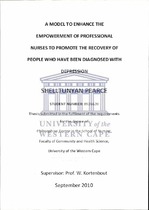| dc.contributor.advisor | Kortenbout, W. | |
| dc.contributor.author | Pearce, Shelltunyan | |
| dc.date.accessioned | 2022-01-17T11:52:48Z | |
| dc.date.available | 2022-01-17T11:52:48Z | |
| dc.date.issued | 2010 | |
| dc.identifier.uri | http://hdl.handle.net/11394/8601 | |
| dc.description | Philosophiae Doctor - PhD | en_US |
| dc.description.abstract | The purpose of this research study is to develop and describe a model to enhance the empowerment professional nurses to promote the recovery of people who have been diagnosed with depression. Depression is a prevalent psychiatric disorder that despite its increase
worldwide, often goes undetected or inadequately treated. The biomedical model's reductionist and dualistic approach proves to be inadequate for nursing practice to address depression and calls for the examination of a multifaceted holistic approach. A multifaceted holistic approach views disease as having multiple causes that are amenable to multiple therapeutic interventions. Despite research evidence about the effectiveness of such an approach, an in-dept literature search did not reveal the availability of such a model to enhance the empowerment of professional nurses to promote the recovery of people who have been diagnosed with depression. The research question that emerged was: • How can professional nurses in the Western Cape be empowered to promote the recovery of people who have been diagnosed with depression? The assumption is that this question was necessary to address. To realise the purpose of this research study, the following objectives were formulated: • To explore and describe the self reported attributes needed by professional nurses to promote the recovery of people who have been diagnosed with depression. • To explore and describe how these self reported attributes can be facilitated in the work environment. • To propose a model to enhance the empowerment of professional nurses to promote the recovery of people who have been diagnosed with depression. • To develop guidelines for the operationalisation of the model. The theoretical framework for this research study was adopted from the Critical Social Theory. The research design and method used was qualitative, explorative, descriptive and contextual in nature. The research was done in two phases. In phase one the researcher did semi- structured interviews with a
purposive and convenient sample of fourteen (14) professional nurses who were working in the Cape Town Metropolitan area and the West Coast. | en_US |
| dc.language.iso | en | en_US |
| dc.publisher | University of the Western Cape | en_US |
| dc.subject | Registered Nurses | en_US |
| dc.subject | Empowerment | en_US |
| dc.subject | Attributes | en_US |
| dc.subject | Depression | en_US |
| dc.subject | Model | en_US |
| dc.subject | Recovery | en_US |
| dc.subject | Critical Social Theory | en_US |
| dc.subject | Biomedical Approach | en_US |
| dc.subject | Multifaceted Holistic Approach | en_US |
| dc.title | A model to enhance the empowerment of professional nurses to promote the recovery of people who have been diagnosed with depression | en_US |
| dc.rights.holder | University of the Western Cape | en_US |

